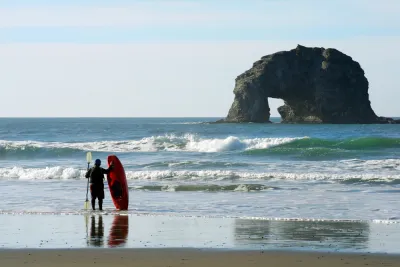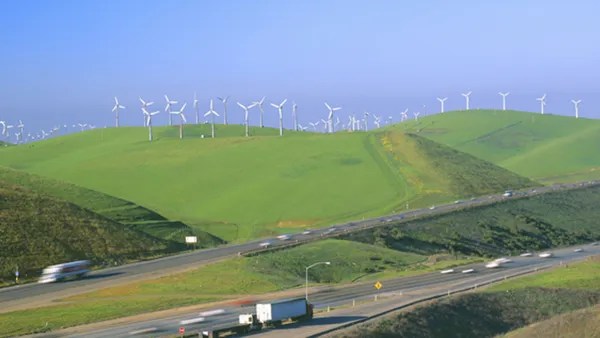Republican state lawmakers repeated a tactic they successfully deployed last summer to prevent the passage of a bill that would have made Oregon the second state, after California, to place a price on carbon emissions from most economic sectors.

"Inside the Salem statehouse Monday morning, the desks on one side of the Senate chamber were empty....For the second time in eight months, Oregon Republicans walked out of the capitol, denying the Democratic supermajority a chance to pass a bill that would limit greenhouse gas emissions," reports Reis Thebault for The Washington Post on Monday, Feb. 24. "By absconding, the 11 GOP lawmakers prevented the quorum necessary to vote on the legislation and forced Democrats to adjourn for the day."
NPR reported on Tuesday that House Republicans also fled the Capitol. [Listen/read the two-minute report by OPB's Dirk VanderHart.]
"SB 1530 would cap the greenhouse gas emissions allowed by the transportation, manufacturing and utility sectors, and lower the cap over time," reported VanderHart and Lauren Dake for OPB on Tuesday. "Large emitters would be required to obtain credits for each metric ton of emissions and could trade those credits among themselves."
A symptom of the urban-rural divide?
While the walkout is entirely partisan, it is also largely geographic and demographic.
"The stalemate illustrates the deep divide between the state’s densely populated, ultraliberal urban enclaves — such as Portland and Eugene — and its sprawling rural counties with proud libertarian streaks, where militia occupations and secession movements have found boosters," continues Thebault.
To some observers, the standoffs portend a grim future for state politics. Also this month, a Republican-led group, Move Oregon’s Border for a Greater Idaho, circulated a petition to move Idaho’s border to the west, subsuming Oregon’s rural eastern counties. The effort is unlikely to succeed, but it plainly exemplifies the state’s widening gulf.
Oregon has been a Democratic trifecta, meaning one party holds both houses of the state legislature and the governor's office, unlike divided government, since 2013, according to Ballotpedia. In the 2018 election, Democrats gained the three-fifths supermajorities in the state’s House and Senate needed to hike taxes, and Gov. Kate Brown, also a Democrat, was narrowly re-elected to her first full term with 50 percent of the vote, reported VanderHart and Dake on Nov. 6, 2018.
She won a special election in 2016 to fill the remaining two years of former Gov. John Kitzhaber’s term.
However, one look at the largely red county map of the state showing the 2018 gubernatorial election results further illustrates the urban-rural divide. Only seven of the state's 36 counties, less than 20 percent, are colored blue.
'Quorum politics' shuts down the government
"Without at least two Republicans showing up in each chamber, Democrats can’t achieve the two-thirds quorum necessary to conduct business," reports VanerHart on Feb. 26. Two Republicans remain, one senator and one representative, both from "Bend districts where registered Democrats outnumber registered Republicans."
Many other important bills in addition to climate legislation have stalled as a result, including "budget adjustments for troubled state agencies, making it easier to site homeless shelters," and wildfire and forestry legislation.
Short 2020 legislative season
The 35-day legislative session that began on Feb. 3 ends on March 8, and only three bills have passed both chambers, noted VanderHart on Wednesday. VanderHart and Dake reported on Jan. 31 on the special session (audio available) that foreshadowed trouble with the carbon bill.
While the overall framework of the new climate bill, Senate Bill 1530, is similar to last year’s, the new legislation also contains tweaks that ease regulations on industrial manufacturers and rural areas of the state. Under the latest conception, for instance, most of the eastern 60% of the state would see no regulation on auto fuels.
But Republicans are still adamant that the cap-and-trade system would be too costly for Oregonians, and are showing no signs they’ll be willing to stay in the building to vote “no” on the bill.
The Republican legislators have indicated that they would return if the Democrats were willing to make the cap-and-trade legislation a state ballot measure, similar to the carbon tax and carbon fee measures defeated by Washington voters in 2016 and 2018, respectively.
"For the Democrats, at least so far, that appears to be a nonstarter," reported VanderHart and Dake on Feb. 25.
Related in Planetizen:
-
What Went Wrong With Oregon's Climate Bill? July 2, 2019
- Oregon Democrats Unveil Cap-and-Trade Bill, February 12, 2019
- Advocates for Oregon's Carbon Pricing Plan Proceed Cautiously, December 12, 2018
FULL STORY: Oregon lawmakers were supposed to vote on a climate change bill. Republicans walked out — again.

National Parks Layoffs Will Cause Communities to Lose Billions
Thousands of essential park workers were laid off this week, just before the busy spring break season.

Retro-silient?: America’s First “Eco-burb,” The Woodlands Turns 50
A master-planned community north of Houston offers lessons on green infrastructure and resilient design, but falls short of its founder’s lofty affordability and walkability goals.

Delivering for America Plan Will Downgrade Mail Service in at Least 49.5 Percent of Zip Codes
Republican and Democrat lawmakers criticize the plan for its disproportionate negative impact on rural communities.

Test News Post 1
This is a summary

Test News Headline 46
Test for the image on the front page.

Balancing Bombs and Butterflies: How the National Guard Protects a Rare Species
The National Guard at Fort Indiantown Gap uses GIS technology and land management strategies to balance military training with conservation efforts, ensuring the survival of the rare eastern regal fritillary butterfly.
Urban Design for Planners 1: Software Tools
This six-course series explores essential urban design concepts using open source software and equips planners with the tools they need to participate fully in the urban design process.
Planning for Universal Design
Learn the tools for implementing Universal Design in planning regulations.
EMC Planning Group, Inc.
Planetizen
Planetizen
Mpact (formerly Rail~Volution)
Great Falls Development Authority, Inc.
HUDs Office of Policy Development and Research
NYU Wagner Graduate School of Public Service





























